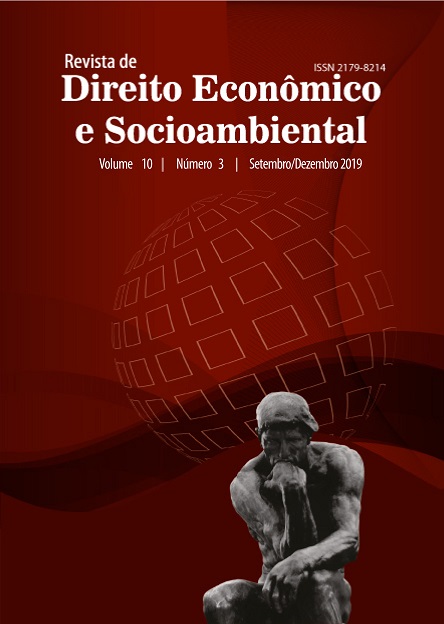Economic assumptions of the Ecological State: looking for sustainability
DOI:
https://doi.org/10.7213/rev.dir.econ.soc.v10i3.25687Keywords:
State, Ecological State, sustainability, strong sustainability, ecocentrism.Abstract
Although many efforts were taken until now, the fact is that environmental questions are still challenging governments and civil society, what is evidenced by the continuous tendency of pollution´s growth, depletion of resources and loss of biodiversity. Considering that considering that anthropocentric conduct, reflected particularly by capitalism, as economic system, and industrialism, as production method, would have led to this disastrous and generalized level of environmental degradation, Klaus Bosselmann has purposed the Ecological State, a theoric model of State (re)organization, ethically based on ecocentrism. The present work intends to introduce the economic assumptions of the Ecological State, to understand in which way it can contribute to improve the notion of strong sustainability. The study points out that economic modern standards, seen as dogmas, are a difficult obstacle to changes and brings some of Tim Jackson´s purposes to reach prosperity without growth to a democratic transition to an Ecological State. The methodological approach is qualitative, pure and the main source of research is bibliographical.
Downloads
References
BOSSELMANN, Klaus. Grounding the Rule of Law – In memorian of Staffan Westerlund. Speech at the Rule of Law for Nature – Environmental Law Conference. University of Oslo, Oslo, Norway, 2012. Keynotes pressed by University of Oslo, May 2012.
BOSSELMANN, Klaus. O princípio da sustentabilidade: transformando direito e governança. São Paulo: Revista dos Tribunais, 2015.
BOSSELMANN, Klaus. When two worlds collide: Society and Ecology. Auckland: RSVP Publishing Company Limited, 1995.
BRAUN, Ricardo. Novos paradigmas ambientais. 2. ed. Petrópolis: Vozes, 2005.
CÂMARA, Ana Stela. Ecological State and Ecocentrism: introductory parameters for sustainability according to Klaus Bosselmann. Revista de Direito Econômico e Socioambiental, Curitiba, v. 8, n. 2, p. 92-113, maio/ago. 2017.
CAPRA, FRIJOF. A Teia da Vida: uma nova compreensão científica dos sistemas vivos. São Paulo: Cultrix, 1996.
CAVALCANTI, Clóvis. Desenvolvimento e respeito à natureza: uma introdução termodinâmica à economia da sustentabilidade. In: FERREIRA, Leila; VIOLA, Eduardo (org.). Incertezas de sustentabilidade na globalização. Campinas: Editora da UNICAMP, 1996.
DALY, Herman. Ecological economics and sustainable development: Selected essays of Herman Daly. Massachussets: Edward Elgar Publishing, Inc., 2007.
DALY, Herman. Forewords. In: JACKSON, Tim. Prosperity without growth: Economics for a finite planet. London: Earthscan, 2009.
DELLAPENNA, Joseph W. Behind the red curtain: environmental concerns and the fall of communism. In: ENGEL, Ronald J.; WESTRA, Laura; BOSSELMANN, Klaus (ed.). Democracy, ecological integrity and international law. Cambridge: Cambridge Scholars Publishing, 2010.
DERANI, Cristiane. Direito Ambiental Econômico. 3. ed. 2.tir. São Paulo: Saraiva, 2009.
FURTADO, Celso. O mito do desenvolvimento econômico. 2. ed. Rio de Janeiro: Paz e Terra, 1974.
GEORGESCU-ROEGEN, Nicholas. La décroissance. 2. ed. Paris: Sang de la terre (Édition eletronique), 1995.
HUGON, Paul. História das doutrinas econômicas. 14. ed. São Paulo: Atlas, 1995.
JACKSON, Tim. Prosperity without growth: Economics for a finite planet. London: Earthscan, 2009.
MARCUSE, Herbert. A ideologia da sociedade industrial: o homem unidimensional. 4. ed. Rio de Janeiro: Zahar, 1973.
MERICO, Luiz Fernando Krieger. Introdução à economia ecológica. Blumenau: FURB, 1996.
PADILHA, Valquíria; BONIFÁCIO, Renata Cristina A. Le Monde Diplomatique. 02 set. 2013. Available in: <http://www.diplomatique.org.br/artigo.php?id=1489>. Access in: 23 mar. 2018.
SANTOS, Boaventura de Sousa. Pela mão de Alice: o social e o político na pós-modernidade. 7. ed. Porto: Afrontamento, 1999.
SERRES, Michel. Le contrat naturel. Paris: Flammarion, 1990.
THE WORLDWATCH INSTITUTE. State of the World 2015: confronting hidden threats to sustainability. Washington: Island Press, 2015.
WEINTRAUB, E. Roy. Neoclassical Economics. In: The concise Encyclopedia of Economics. Available in: <http://www.econlib.org/library/Enc1/Neoclassical Economics.html>. Access in: Jan. 10th, 2018.
Downloads
Published
How to Cite
Issue
Section
License
Authors who publish in this Journal agree to the following terms:
- Authors retain copyright and grant the Journal of Economic and Socio-Environmental Law the right of first publication with the article simultaneously licensed under the Creative Commons - Attribution 4.0 International which allows sharing the work with recognition of the authors and its initial publication in this Journal.
- Authors are able to take on additional contracts separately, for non-exclusive distribution of the version of the paper published in this Journal (eg.: publishing in institutional repository or as a book), with a recognition of its initial publication in this Journal.
- Authors are allowed and encouraged to publish their work online (eg.: in institutional repositories or on their personal website) at any point before or during the submission process, as it can lead to productive exchanges, as well as increase the impact and the citation of the published work (see the Effect of Open Access).





















